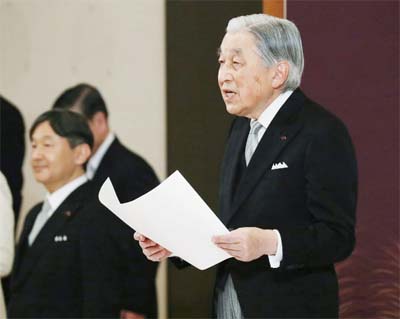
Reuters, Tokyo :
Japanese Emperor Akihito, in his final remarks as his three-decade reign drew to a close on Tuesday, thanked the people for their support and expressed hope for a peaceful future.
Akihito, 85, the first monarch to abdicate in two centuries, had sought to ease the painful memories of World War Two and bring the monarchy closer to the people, including those marginalized in society. The popular Akihito was the first monarch to take the Chrysanthemum Throne under a post-war constitution that defines the emperor as a symbol of the people without political power. His father, Hirohito, in whose name Japanese troops fought World War Two, was considered a living deity until after Japan’s defeat in 1945, when he renounced his divinity. “To the people who accepted and supported me as a symbol, I express my heartfelt thanks,” Akihito, wearing a Western-style morning coat, said at a brief abdication ceremony in the Imperial Palace’s Matsu no ma, or Hall of Pine.
“Together with the empress, I hope from my heart that the new Reiwa era that begins tomorrow will be peaceful and fruitful, and pray for the peace and happiness of our country and the people of the world,” said a solemn Akihito, referring to the new imperial era. Standing on a white dais flanked by Empress Michiko, who wore a long white and gray dress, Akihito bowed after he spoke.

